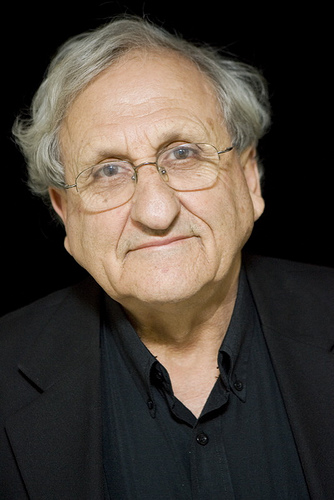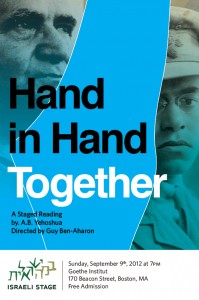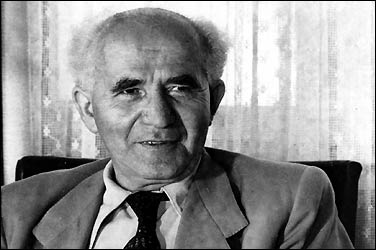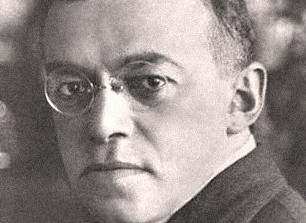Stage Interview: Cracking Eggs to Make An Omelet —Talking to Israeli novelist and playwright A.B. Yehoshua
The latest play by the celebrated Israeli writer A. B. Yehoshua is a historical drama that revolves around an imaginary conversation between two major political rivals about Zionism and the founding of Israel. Israeli Stage is presenting the American premiere of a staged reading of the script.
By Debra Cash
A. B. Yehoshua stands in a long line of Israeli literary figures—from Theodor Herzl to David Grossman—who have made strong claims on the state’s ideological and political life. A fifth generation Israeli of Sephardic Jerusalemite heritage, born in 1936, Yehoshua is a much-celebrated novelist, playwright, and a regular editorialist for the left-leaning newspaper Haaretz, where he continues to agitate for a two-state solution to the impasse between Israelis and Palestinians.
This evening, Israeli Stage will present at the Goethe Institut in Boston a sold-out reading of his 2012 play Hand in Hand Together, translated in its prior British version as Can Two Walk Together? In the script, two political rivals, Labor Zionist David Ben Gurion (1886–1973), who would become the first Prime Minister of Israel, and Ze’ev Jabotinsky (1880–1940), the theorist of the Zionist Revisionist Betar party, meet in London.
Like James Joyce, Vladimir Lenin, and Tristan Tzara, who are portrayed as coming together in Zurich at the dawn of the Russian Revolution in Tom Stoppard’s intellectual farce Travesties, Yehoshua’s play is a fanciful re-imagining of a collision of historical figures at a momentous juncture. There, however, the analogy ends, because the record shows that Ben Gurion and Jabotinsky indeed met privately in London in 1934—after the 1917 Balfour Declaration supporting a Jewish Homeland in Palestine but before the founding of Israel in 1948—to discuss the way forward. On at least one of those occasions, Ben Gurion cooked Jabotinsky an omelet.
Israeli Stage producing director Guy Ben-Aharon translated the play from the Hebrew for the Boston reading. Yehoshua spoke from his home in Haifa. This interview has been condensed and edited, and while his spoken English is excellent, I have made minor grammatical corrections and translated Hebrew terms and references.
Arts Fuse: How did you come to learn the story of David Ben Gurion and Ze’ev Jabotinsky meeting in London in 1934 and Ben Gurion cooking Jabotinsky an omelet?
Yehoshua: I heard only last year about this thing from Dan Miron, who wrote a book about the prose and poetry of Jabotinsky. He gave me his very interesting book, and he told me about a meeting between Ben Gurion and Jabotinsky that I did not know of at all. They had eight meetings, and in one of those meetings, Ben Gurion made an omelet for Jabotinsky. Jabotinsky was very, very lousy in the kitchen! It was this very minor fact that immediately gave me the inspiration to write the play.
I wrote it very quickly and gave it to the historian to check that I did not make mistakes about the positions of these two leaders.
AF: Your own family heritage is Sephardic, but these men were the Ashkenazi architects of modern Zionism. Did you have a different attitude towards them as a child than you do now?
Yehoshua: You see, of course, my family is coming from pre-Zionist Jews, they are coming from Saloniki [Salonika] in the middle of the nineteenth century, before Zionism. My mother came from Morocco in ’32.
You cannot imagine how secular Ben Gurion and Jabotinsky were. Ben Gurion did not do seder on Pesach [Passover] in his home for many years; he would not enter a synagogue. Jabotinsky was also secular. The attraction to me was to find the sources of the gap or the discussion or the fight between Right and Left in the Zionist movement without the question of religion. My feeling is that [today] the ideological debate in Israel is not between Right and Left but between nationalism and religion.
AF: Do you think that Ben Gurion and Jabotinsky ever foresaw the revival of religion in Israeli society?
Yehoshua: No, they did not. They saw the importance of the religious people, but neither of them imagined that religion would return with such a force among Jews, among Muslims, and among Christians. My feeling is that the basic and very important elements of this ideological discussion today is [the struggle] between the national idea and the religious idea, which has another source of authority than the nationalist idea, which sees the people as having to decide democratically what to do and what not to do. The religious have totally another source of authority they want to obey. This is the problem: the source of authority in Israel—the people or God, or whatever is around, the rabbis.
I wanted to see the discussion in 1934 about the possibility of hastening the creation of the state of Israel by force, as Jabotinsky proposed. Ben Gurion hesitated because he thought that this very audacious and provocative move would destroy what little had been achieved until then.
The question was between Ben Gurion’s proposal, to go slowly [to build] a just society, and Jabotinsky’s alternative, which saw that the most urgent thing was to fight the English and to bring the Jews to Eretz Yisrael [the Land of Israel] as fast as possible. Both of them sensed the coming Shoah [holocaust], but of course Jabotinsky was more accurate about need for haste.
I put the question [in my play], would there have been any possibility of a state before the Holocaust? This is the question that I cannot answer.
AF: Many of your writings—I am thinking particularly of the novel Mr. Mani (published in Hebrew in 1989 and in English in 1992)—take the form of a conversation. It occurs to me that that is very dramatic, but it is also very Talmudic in that the modality is of interaction between people with strong views. Why do you like conversations as a vehicle for those explorations?
Yehoshua: [Hand in Hand Together is] not the first play that I have written, but this is the first ideological play that I have had staged. The script’s characters are still relevant in the ideological context in Israel. You open the newspaper, and day after day, you see the name of Ben Gurion and the name of Jabotinsky. They are points of reference regarding the creation of the state of Israel—more than any other leaders or prime ministers. Especially Jabotinsky for the Right wing.
The play was staged in the Knesset with the Prime Minister, the President, and many other ministers in the audience. The people from the Right, the classical Right wing, they were very moved because for them Jabotinsky was a very important symbol. The speaker of the parliament has given a half million shekels to promote the play in schools, and it was presented at the military academy to high-ranking officers.
[Ben Gurion and Jabotinsky] were great negators of the golah [shol’lai ha-golah, those who “negate” the diaspora through their belief that once a Jewish state was established, Jews would immediately immigrate]. Jabotinsky for existential reasons. He argued “if you do not liquidate the golah [diaspora], the golah will liquidate you.” The Holocaust proved how right he was. Ben Gurion was also critical of the golah, not because of the pogroms but because of his feeling that the golah is a perversion of the Jewish people. He was trying to change the identity of the Jewish people that had been formed and shaped for thousands of years by the golah.
AF: I’ve read that in your play Ben Gurion suggests that he would like to head a Ministry of Identity in the new state of Israel. It’s a wonderful and problematic image.
Yehoshua: I would like to be the Minister of Identity! (Laughs) To try to change some elements of the identity of the Jews!
AF: What would be your first act as Minister?
Yehoshua: The first act would be to say that a Jew who does not speak Hebrew is not a Jew. He must know Hebrew. That Hebrew is a necessary component of his identity.
As you know very well, I am debating this idea with people in the diaspora. I say to them “you are a partial Jew while in Eretez Yisrael you are a total Jew.” This is, of course, something that is annoying to many people, but as the Minister of Identity, that is how I would arrange that issue!
c 2012 Debra Cash
Tagged: A.B. Yehoshua, David Ben Gurion, Hand in Hand Together, Israeli Stage




